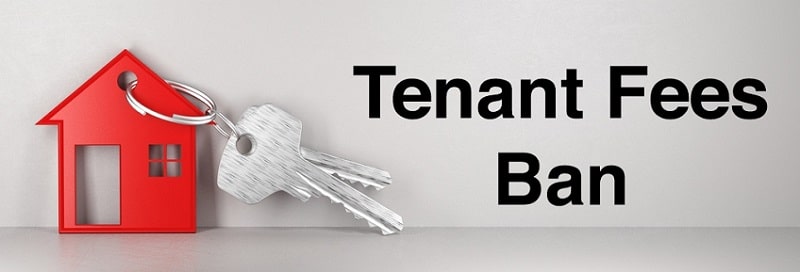The Tenant Fee Bill has now passed its final reading, meaning from June 1st 2019, tenants can no longer be charged for the typical administration fees associated with setting up and running shorthold tenancy contracts. The new legislation is aimed at helping tenants mitigate some of their upfront costs which, in the government’s opinion, is a barrier to population mobility.
Landlords need to be aware of these new regulations and what the likely impact will be to them.

What letting fees are no longer allowed under the tenant fee ban?
From the 1st June, landlords will no longer be able to charge for:
- Referencing
- Right to rent checks
- Inventory check-out fees
- Tenancy renewal fees
- Pet deposits
Will the tenancy fee ban affect deposits?
Security deposits, paid at the start of a tenancy to cover any damage to a property, are now being capped at 5 weeks’ rent and are still required to be paid into a deposit protection scheme.
Holding deposits, that are sometimes paid by tenants to demonstrate a commitment to rent a property, can be a maximum of one weeks’ rent. There are now certain rules in place that will require a deposit be repaid if the tenancy does not go ahead.
Who will be affected by the fee ban?
The new law will affect both letting agents and landlords and is being introduced in two stages. Tenants entering into a new shorthold tenancy agreement or renewing an existing contract after 1st June will be exempt from paying the fees. However, those signing a contract before that date will still be liable. From the 1st June 2020, there will be an outright ban, where none of the fees outlined above can be charged and the deposit restrictions come into play.
What can landlords still charge for?
The fees that tenants can be charged for are:
- Rent
- Tenants’ deposits – (capped at five weeks’ rent)
- Refundable holding deposits – (capped at one weeks’ rent)
- Charges for changing the tenancy including the tenant wanting to terminate the agreement early
- When a tenancy is terminated early, the tenants remain liable for the rent and utility bills until a new tenant is found
- Charges for defaulting on the tenancy agreement such as late rent payments or charges for replacing a lost key
- Utilities where applicable
Under the new rules, charges of this sort must only reflect the costs of completing the request. Fines for missing rent payments should only reflect costs incurred and rent owed. Any fees or fines of this sort must have supporting evidence, such as invoices or receipts.
How will the ban be enforced? Will there be fines for breaking the lettings fees ban?
Tenants will be able to claim from landlords any money they should not have paid via the County Court and Trading Standards can issue a fine of up to £5,000 for a first offence.
Landlords can rest assured that by using a reputable lettings agency (such as Michael Hardy) to manage their property, they will not be at risk of erroneously charging tenants any illegal fees after the ban comes into force, and that if refunding of deposits or monies held is required, it will be managed on their behalf.
The potential impact for landlords
At this early stage, most letting agencies are still considering the fairest way to mitigate the loss of income resulting from the ban that ensures landlords don’t have to carry too much of the burden. Agencies are expected to absorb some of the costs, but a percentage of the administration fees will have to now be covered by landlords.
Landlords can offset their increased costs by upping rents, but this will need to be in line with local market forces. Whereas, previously, renewing tenants may not have seen increases in the rent, landlords will be now be more likely to review rent more regularly, any increase subject to market forces. What is not permitted under the new bill, is increasing rent for the first couple of months of a tenancy in order to cover the cost of set-up fees.
Whereas it is no longer possible to charge an additional deposit for tenants with pets, landlords can legitimately increase the cost of the rent (provided details of this potential extra charge are made clear from the outset).
Ultimately, we believe that we can find a way to keep the private property rental business fair for tenants and profitable for landlords. While there may be a short-term impact on annual profits as the market adjusts, buy-to-let property still makes for an attractive long-term investment when you consider the rental yields plus potential capital growth.
If you have any questions please do not hesitate to call our Lettings team on 0118 977 6776

